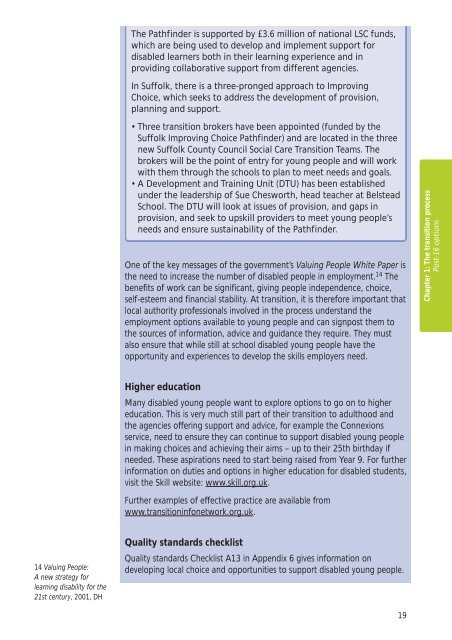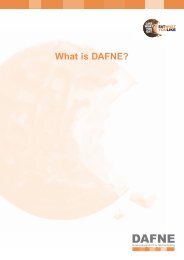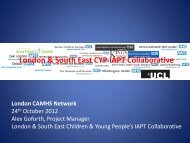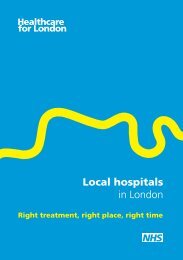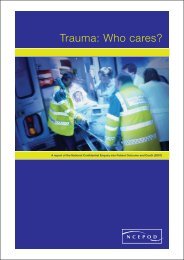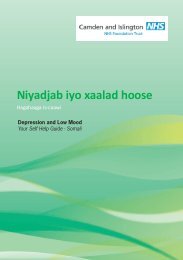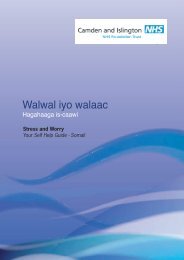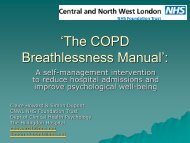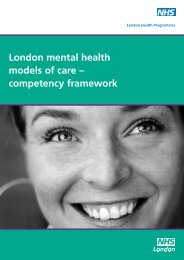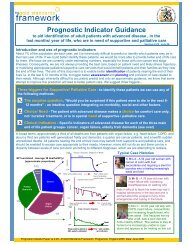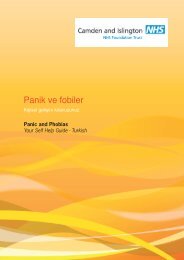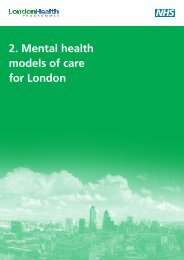A Transition Guide for All Services - Transition Information Network
A Transition Guide for All Services - Transition Information Network
A Transition Guide for All Services - Transition Information Network
- No tags were found...
You also want an ePaper? Increase the reach of your titles
YUMPU automatically turns print PDFs into web optimized ePapers that Google loves.
The Pathfinder is supported by £3.6 million of national LSC funds,which are being used to develop and implement support <strong>for</strong>disabled learners both in their learning experience and inproviding collaborative support from different agencies.In Suffolk, there is a three-pronged approach to ImprovingChoice, which seeks to address the development of provision,planning and support.• Three transition brokers have been appointed (funded by theSuffolk Improving Choice Pathfinder) and are located in the threenew Suffolk County Council Social Care <strong>Transition</strong> Teams. Thebrokers will be the point of entry <strong>for</strong> young people and will workwith them through the schools to plan to meet needs and goals.• A Development and Training Unit (DTU) has been establishedunder the leadership of Sue Chesworth, head teacher at BelsteadSchool. The DTU will look at issues of provision, and gaps inprovision, and seek to upskill providers to meet young people’sneeds and ensure sustainability of the Pathfinder.One of the key messages of the government’s Valuing People White Paper isthe need to increase the number of disabled people in employment. 14 Thebenefits of work can be significant, giving people independence, choice,self-esteem and financial stability. At transition, it is there<strong>for</strong>e important thatlocal authority professionals involved in the process understand theemployment options available to young people and can signpost them tothe sources of in<strong>for</strong>mation, advice and guidance they require. They mustalso ensure that while still at school disabled young people have theopportunity and experiences to develop the skills employers need.Chapter 1: The transition processPost-16 optionsHigher educationMany disabled young people want to explore options to go on to highereducation. This is very much still part of their transition to adulthood andthe agencies offering support and advice, <strong>for</strong> example the Connexionsservice, need to ensure they can continue to support disabled young peoplein making choices and achieving their aims – up to their 25th birthday ifneeded. These aspirations need to start being raised from Year 9. For furtherin<strong>for</strong>mation on duties and options in higher education <strong>for</strong> disabled students,visit the Skill website: www.skill.org.uk.Further examples of effective practice are available fromwww.transitioninfonetwork.org.uk.14 Valuing People:A new strategy <strong>for</strong>learning disability <strong>for</strong> the21st century, 2001, DHQuality standards checklistQuality standards Checklist A13 in Appendix 6 gives in<strong>for</strong>mation ondeveloping local choice and opportunities to support disabled young people.19


